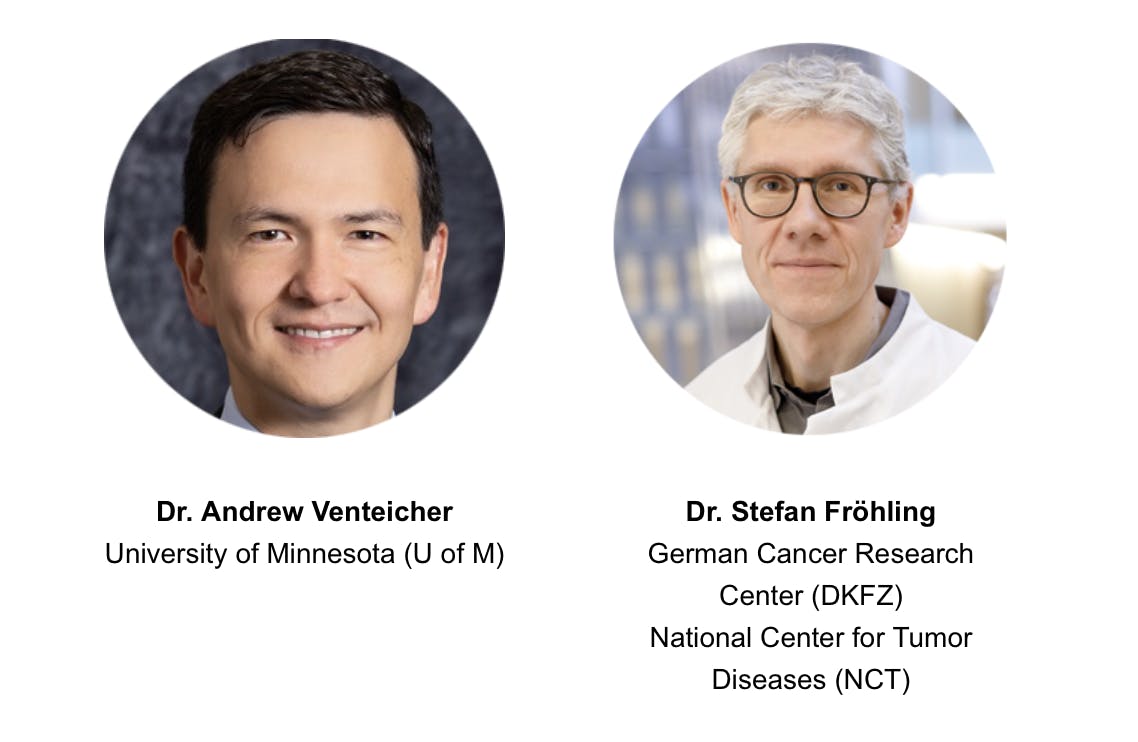The Chordoma Foundation is thrilled to have awarded two new $250,000 research grants aimed at generating a more complete picture of chordoma biology. The funds will support teams led by investigators at the University of Minnesota (U of M) and the German Cancer Research Center (DKFZ) and the National Center for Tumor Diseases (NCT) in Heidelberg, Germany, as they uncover drivers of chordoma metastasis and actionable differences in tumor subtypes, including tumors of different anatomic locations. Their findings are expected to uncover new therapeutic targets and inform personalized treatment strategies for chordoma patients.
Synergy sets the stage for success
The teams will be led by Dr. Andrew Venteicher, Neurosurgical Director of the Center for Skull Base and Pituitary Surgery at the U of M, and Dr. Stefan Fröhling, Head of the Division of Translational Medical Oncology at DKFZ and NCT and Managing Director of the NCT. We’ve connected the two groups with each other, allowing for coordinated efforts and an exchange of observations and data across U.S. and European patient cohorts.

Both groups have access to large numbers of chordoma tumor samples. Dr. Venteicher’s team is partnering with the University of Pittsburgh Medical Center to access the largest high-quality set of skull base tumors in the world, including primary and recurrent chordoma samples. Dr. Fröhling’s samples are complementary, including tumors from all anatomical locations and enriched for advanced disease, from one of the highest-volume chordoma clinics in Europe. And the teams have already generated compelling preliminary data, enabling them to move quickly towards meaningful biological insights.
Learning from the bigger picture
In the past decade, significant progress has been made in understanding distinct parts of chordoma biology: alterations in genes (genome), gene transcription (transcriptome), and protein function (proteome). But when it comes to a comprehensive grasp of how these and other biological layers (other “omes”) interact as a whole to drive disease behavior, major gaps remain. Each of these “omic” layers provides important information about the nature of the tumor, much like different layers of a map (e.g., topo, road, satellite) describe different aspects of a geographic area, and only by analyzing multiple layers together does a meaningful picture emerge.
To paint this more complete picture, our grantees will apply a variety of advanced “omics” approaches to blood and tumor samples from chordoma patients. By analyzing this data across a large cohort of tumors matched with clinical outcome data, the teams will determine whether actionable differences exist between certain subgroups of patients – for example, by different anatomical locations (skull base, spine, and sacrum) – with the goal of establishing more individualized treatment approaches to improve patient outcomes. An additional aim is to identify new therapeutic targets, particularly for patients with metastatic disease. To support this aim, they have assembled samples which include metastatic tumors and primary tumors, some of which eventually went on to metastasize. Looking for similarities and differences among and between these tumor types will allow the researchers to identify features shared by metastatic tumors and help determine the factors responsible for driving the metastatic process.
Moreover, because Dr. Fröhling’s cohort includes many patients with advanced disease who’ve been treated with various systemic therapies either off label or in clinical trials, the investigators are in a position to explore biomarkers capable of predicting response to these treatments.
And in the near term, as new therapeutic hypotheses emerge from this work, the Foundation’s Drug Screening Program is poised to test them quickly and systematically.
Our research values in action
In keeping with our commitment to invest strategically, the projects were chosen through a competitive process in which 19 initial concepts were thoroughly evaluated by a panel of subject matter experts to identify projects most likely to fill key knowledge gaps identified by our scientific advisors. Drs. Venteicher and Fröhling’s expertise, impressive capabilities, compelling preliminary data, and willingness to make use of shared resources excellently positions their teams to answer the questions at hand.
We’re deeply grateful to the Beckman Family Foundation, the Team Mac Campaign, and other donors whose generosity is making these projects possible.
Sign up for our newsletter
To learn about exciting recent research results, newly launched projects, and how you can help drive progress, subscribe to our newsletter.